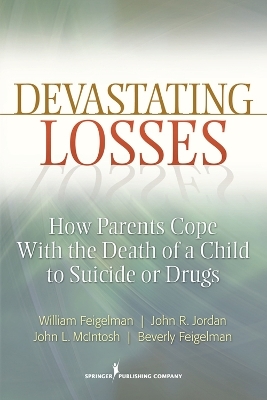
Devastating Losses
Springer Publishing Co Inc (Verlag)
978-0-8261-0746-6 (ISBN)
The text emphasises the sociological underpinnings of survivors' grief and provides data that vividly documents their critical need for emotional support. It explains how bereavement difficulties can be exacerbated by stigmatisation, and by the failure of significant others to provide expected support. Also explored in depth are the ways in which couples adapt to the traumatic loss of a child and how this can bring them closer or render their relationship irreparable. Findings suggest that with time and peer support affiliations, most traumatically bereaved parents ultimately demonstrate resilience and find meaningful new roles for themselves, helping the newly bereaved or engaging in other humanitarian acts.
Key Features:
>li> Offers researchers, clinicians, and parent-survivors current information on how parents adapt initially and over time after the traumatic loss of a child
Presents data culled from the largest survey ever conducted (575 individuals) of parents surviving a child's suicide or other traumatic death
Investigates the ways in which stigmatisation complicates and prolongs the grieving process
Addresses the tremendous value of support groups in the healing process
Explores how married couples are affected by the traumatic loss of their child
William Feigelman, PhD, is Professor Emeritus and Adjunct Professor of Sociology at Nassau Community College (Garden City, New York), where he has taught for more than 44 years and still teaches part-time. Author and co-author of six books and more than 40 journal articles, he has written on a wide variety of social science subjects including child adoptions, youth alcohol and drug abuse, problem gambling, tobacco use and cessation, and intergroup relations. Since 2002, after his son Jesse's suicide, Dr. Feigelman has focused his professional writings on youth suicide and suicide bereavement. This work has appeared in Suicide and Life-Threatening Behavior, Death Studies, Omega: Journal of Death and Dying and Illness, Crisis and Loss. He is a member of the American Association of Suicidology and the Association for Death Education and Counseling, a frequent presenter at bereavement conferences in the U.S., Canada, and Japan, and a co-facilitator of a survivors' support group |||Beverly Feigelman, ACSW, is Adjunct Professor of Social Work at Adelphi University (Garden City, New York). She also maintains a private psychotherapy practice, providing family and individual counseling. She is an educational consultant for the Bellmore-Merrick (Long Island, New York) School District, training graduate social work students for work in secondary school settings. Ms. Feigelman is a member of various suicide prevention organizations, including the American Foundation for Suicide Prevention, SPAN-USA, and the American Association of Suicidology, and a co-facilitator of a survivors' support group. She is also author or co-author of several articles on suicide bereavement, addiction treatment, and social work education. Ms. Feigelman often presents on these topics at professional conferences. She is also Chairperson of the Long Island Chapter of the Association for the Advancement of Social Work with Groups
Introduction
Chapter 1: Theoretical Issues Guiding this Research and How the Data were Collected
Section I: Factors Associated With the Loss Experience
Chapter 2: Suicide Stigma and Compounding of a Survivor's Grief Difficulties
Chapter 3: Drug Overdose Deaths and Survivors' Grief: A Greatly Neglected Subject
Chapter 4: Differences in the Suicide Death Circumstances And How They May Affect Survivors' Grief
Chapter 5: Grief Overload: The Impact of Multiple Losses, Only Child Loss and Multiple Stressor Events on Bereaved Parents
Section II: Forms of Bereavement Assistance and How They Help Survivors Cope
Chapter 6: Early Years After Loss: Survivors Get Help and Advance from Their Depths of Despair
Chapter 7: Later Years After Loss: Identifying the Postvention Needs of Survivors
Chapter 8: The Healing Potential of Survivor Support Groups
Chapter 9: How Survivors Use Support Groups: Comings and Goings
Chapter 10: Personal Growth After A Suicide Loss: Is it Associated With A Survivor's Mental Health?
Chapter 11: Internet Support Groups for Suicide Survivors: A New Form of Grief Support
Section III: The Impact of a Child's Traumatic Death on Married Couples
Chapter 12: Gender Differences in Grief After the Death of a Child
Chapter 13: Investigating Whether Child Loss Promotes Harmony or Discord Among Married Couples
Section IV: Where Do we Go From Here?
Chapter 14: Suggestions for Future Research
Appendix: The Survey Research Instrument
| Verlagsort | New York |
|---|---|
| Sprache | englisch |
| Gewicht | 456 g |
| Themenwelt | Sachbuch/Ratgeber ► Gesundheit / Leben / Psychologie ► Psychologie |
| Geisteswissenschaften ► Psychologie ► Trennung / Trauer | |
| Sozialwissenschaften ► Soziologie ► Mikrosoziologie | |
| ISBN-10 | 0-8261-0746-X / 082610746X |
| ISBN-13 | 978-0-8261-0746-6 / 9780826107466 |
| Zustand | Neuware |
| Haben Sie eine Frage zum Produkt? |
aus dem Bereich


